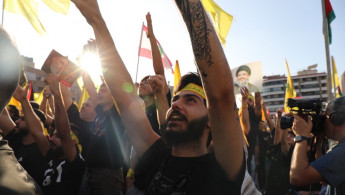Hezbollah chief Nasrallah promises to 'deter' Israel as Gaza war continues
In his first speech since the Israel-Gaza war began on October 7, Hezbollah chief Hassan Nasrallah promised on Friday a continuation of the 'tit-for-tat' border clashes while warning that "all options are on the table," if Israel should choose to escalate in Gaza or Lebanon.
Nasrallah neither proposed a detente or escalation as some regional observers were expecting, but instead said that the Lebanese militia has been "actively engaged" in battle since 8 October – the day after Hamas's surprise attack on southern Israel.
He further emphasised to his supporters that the border clashes were meant to "deter" Israel and draw its resources away from Hamas in Gaza.
In this, the group had been effective, he said, claiming that Israel had diverted at least a "third" of its army to the Lebanese border and provoked "a state of anxiety" in Israel which has helped lighten the military assault on Gaza.
To date, Hezbollah claims to have killed or wounded at least 120 Israeli soldiers and damaged scores of tanks, as well as Israeli surveillance equipment and radars. Israel has not released its full casualty figures, neither in Gaza nor along its northern border.
Nasrallah further called on the US to support a "ceasefire" and end "Israeli aggression" in Gaza – warning that Hezbollah would not be deterred by the US naval and air power in the region in the event of further escalation by Israel.
US Secretary of State Antony Blinken arrived in Israel on Friday to ask for a "humanitarian pause" in fighting in Gaza – a request that Israeli Prime Minister Benjamin Netanyahu has rejected.
Portraying a 'measured' approach
Nasrallah's speech was not the firebrand approach that some expected of the militia leader, but instead was an attempt to "showcase the group as being measured and responsible," Dr. Karim el Mufti, a senior lecturer in Global Affairs at Sciences Po, told The New Arab.
"There is an urging for the stopping the massacre of civilians, trying to really show a measured stand. It's obviously not the time for Hezbollah to escalate to a total war from the Lebanese front," el Mufti said.
The ongoing clashes between Israel and Hezbollah on the border, while gradually escalating, have not spilled over into full-on fighting, seemingly a deliberate choice from both sides.
Hezbollah's allies, the Houthis in Yemen, Iranian-allied militias in Iraq and Syria, have all launched small-scale attacks against Israel in the last few weeks – hinting at the form a regional war could take.
Nasrallah commended its allies for their actions "in solidarity with the resistance," but emphasised that they were acting on an individual scale rather than as a coordinated front under the leadership of Iran.
He pointed to Hamas's attack on Israel being a "purely Palestinian decision" as evidence of this.
"Iran exerts no control over the resistance factions, with the true decision-makers being the leaders of the resistance and their dedicated fighters," he said.
Still, he warned that the so-called resistance axis could act in concert if need be, should what he termed as "Israeli aggression" against Gaza and Lebanon continue.
The continuation of open-ended clashes on the Lebanese-Israeli border – with Nasrallah promising to kill an Israeli for each Lebanese civilian killed – was in line with Hezbollah's policy of deterrence but also gave an off-ramp to current fighting.
"Even though this will be taken as a threatening speech by the Israelis and the US, there is an open door to detente, now it's to be seen if the Israelis will pick up on this or not," el Mufti said.
'Our trust is in the Seyyed'
While much of Nasrallah's speech was aimed at international powers – namely Israel and the US – much of it was also a homage to his Lebanese support base.
His speech was broadcast to thousands in the southern suburbs of Beirut, where supporters waved flags and hung off their balcony as he spoke.
"I cannot say what [Nasrallah] will say today, but I know that he will calm our hearts," Hisham, a 19-year-old Hezbollah supporter, told TNA at the rally.
Much of his speech was dedicated to commemorating the 58 Hezbollah fighters and Lebanese civilians killed by Israeli shelling, promising to "finish the fight" so they did not die in vain.
As a recompense for his three weeks of silence, he outlined the group's strategy in fighting Israel – namely drawing Israeli resources away from Gaza and maintaining a policy of strategic ambiguity.
The crowd erupted in cheers when he said that at least a third of the Israeli army was stationed on the Lebanese-Israeli border as a result of the group's rocket attacks.
When his hour-and-a-half long speech ended, his supporters chanted "we are with you Nasrallah!" and danced to pro-Hezbollah music.
"His speech was better than I could imagine. We used to say Israel is only standing on one-and-a-half legs, but after today they cannot even stand at all," Fatima, a 37-year old resident of southern Lebanon, told TNA.





 Follow the Middle East's top stories in English at The New Arab on Google News
Follow the Middle East's top stories in English at The New Arab on Google News


